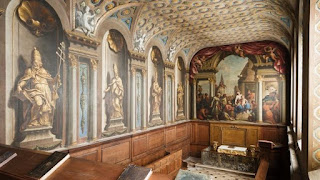Music for Wimpole Hall - Thomas Tudway, James Hawkins; Eboracum Baroque
Reviewed by Robert Hugill on Oct 23 2015
Star rating:
Music for the chapel at Wimpole Hall, recorded in situ by this young baroque ensemble
Wimpole Hall is one of the largest houses in Cambridgeshire. It has something of a chequered history, passing through various hands due to lack of money or lack of an heir and was given to the National Trust by Elsie Bambridge (Rudyard Kipling's daughter). In the early 18th century it was in the hands of the bibliophile, collector and patron of the arts, Lord Harley who employed the composer Thomas Tudway to create volumes of English church music spanning the early 1600's to the 1720's. Tudway included his own music in the volumes as well as that of his contemporaries, and when the newly built Wimpole chapel was opened in 1721 Tudway composed a Te Deum and Jubilate for the service (presumably Matins).
On this disc Eboracum Baroque, directed by Chris Parsons, have recorded Tudway's Te Deum and Jubilate along with other music by Tudway, James Hawkins and James Paisible, in the venue for which much of it was written, Wimpole Hall chapel.
Reviewed by Robert Hugill on Oct 23 2015
Star rating:
Music for the chapel at Wimpole Hall, recorded in situ by this young baroque ensemble
Wimpole Hall is one of the largest houses in Cambridgeshire. It has something of a chequered history, passing through various hands due to lack of money or lack of an heir and was given to the National Trust by Elsie Bambridge (Rudyard Kipling's daughter). In the early 18th century it was in the hands of the bibliophile, collector and patron of the arts, Lord Harley who employed the composer Thomas Tudway to create volumes of English church music spanning the early 1600's to the 1720's. Tudway included his own music in the volumes as well as that of his contemporaries, and when the newly built Wimpole chapel was opened in 1721 Tudway composed a Te Deum and Jubilate for the service (presumably Matins).
On this disc Eboracum Baroque, directed by Chris Parsons, have recorded Tudway's Te Deum and Jubilate along with other music by Tudway, James Hawkins and James Paisible, in the venue for which much of it was written, Wimpole Hall chapel.
 |
| The Chapel at Wimpole Hall |
The disc opens with Thomas Tudway's Jubilate, a relatively small scale piece with a rather galant feel. In the tutti passages the individual voices each have their own vibrant presence, a vocal ensemble rather than a choir. The music is structured like a verse anthem and there are some lovely solo moments. The whole makes a good strong firm sound.
 |
| Thomas Tudway |
James Hawkins was organist at St John's College, Cambridge, and later at Ely Cathedral. He helped Tudway create the volumes of music for Lord Harley. So here the group includes a fine anthem by Hawkins, Blessed be thou, Lord God of Israel followed by Tudway's large scale Oh how aimiable are thy dwellings, and his Te Deum, both of which were sung at the opening of Wimpole's chapel. Eboracum Baroque performs with a nice sense of style combined with great vibrancy of tone from the singers.
The music on this disc is an intriguing and welcome discovery. Eboracum Baroque has made an enterprising disc, recording relatively unknown music in the venue for which it was written.
The disc can be bought direct from Eboracum Baroque's website.
Thomas Tudway (c1650-1726) - Jubilate 'Wimpole' [8.45]
Thomas Tudway (c1650-1726) - I will lift up mine eyes [7.09]
James Paisibe (c1656-1721) - Sonata in D [4.35]
Thomas Tudway (c1650-1726) - Hail, happy day 'An Ode compossed for the Queen's Birthday' [10.06]
James Hawkins (1662-1729) - Blessed be thou Lord God of Israel [6.16]
Thomas Tudway (c1650-1726) - O how aimiable are thy dwellings [11.33]
Thomas Tudway (c1650-1726) - Te Deum 'Wimpole' [23.55]
Elsewhere on this blog:
- The Telling and Niamh Cusack at BREMF: Vision: The Imagined Testimony of Hildegard von Bingen - concert review
- Musica Secreta at BREMF: Lucrezia Borgia's Daughter - concert review
- Poetry in music: The Sixteen & Harry Christophers - CD review
- Stockholm's Concert Hall is our home: My encounter with Stefan Forsberg of the Royal Stockholm Philharmonic Orchestra
- Time Machine: Roger Doyle, Answer-phone message and electro-acoustic music - CD review
- Violin showpieces transformed: Silver Bow from flautist Katherine Bryan
- Brave and bold: Tamsin Waley-Cohen & Huw Watkins in Hahn and Szymanowski - Cd review
- A shattering Butterfly in Stockholm: Asmik Grigorian in Kristen Harms' production at Royal Swedish Opera - opera review
- Not just another orchestra: Marios Papadopoulos and the Oxford Philharmonic Orchestra - interview
- Boulanger in Stockholm: Marc Soustrot and the Royal Stockholm Philharmonic in music by Lili and Nadia Boulanger - concert review
- In fine fettle, if lacking light and shade at first: Leo Nucci at Rosenblatt Recitals - concert review
- The Cello goes Latin American: Ophelie Gaillard Alvorada - CD review
- New music for woodwind: Twisted Skycape from Shea Lolin & Czech Philharmonic Wind Ensemble - CD review
- Intense & intellligent: Belcea Quartet in Mozart, Webern & Schubert - concert review
- Lithe and dramatic: ETO's Hollywood Hoffmann - Opera review
- Showcasing period flute and piano: Finchcocks Schubertiade - Cd review
- From ritual humiliation to meditation: My encounter with conductor Rachael Young - interview
- Home



,%20William%20Morgan%20(Male%20Chorus)%20(c)%20Richard%20Hubert%20Smith.jpg)





.jpg)
%20Benjamin%20Ealovega.jpg)

No comments:
Post a Comment